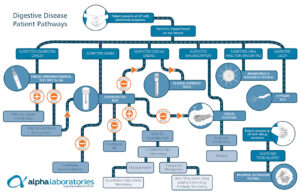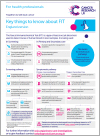Endoscopy departments are under increasing pressure to meet the demands for colonoscopy services to diagnose patients with a wide range of abdominal symptoms. Waiting lists are long which can mean that potentially some patients with bowel cancer are delayed in receiving a diagnosis and treatment.
Publications support the Faecal Immunochemical Test (FIT) for haemoglobin (Hb) as a rule out test for cancer with a negative predictive value (NPV) of 100% using a cut off concentration of 10μg Hb/g faeces.
The research (1) also supports a NPV of 94.6% for High-Risk Adenoma (HRA), 93.5% for Low-Risk Adenoma (LRA) and 94% for Inflammatory Bowel Disease. It also demonstrates that with an increased severity of disease a higher faecal haemoglobin (f-Hb) concentration is detected. Thus FIT enables management of the patient pathway and most effective use of resources based on appropriate evidence.






